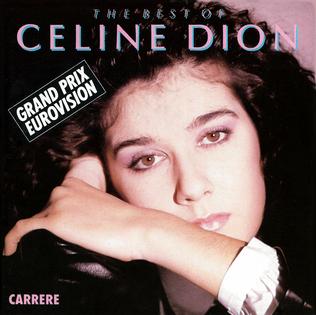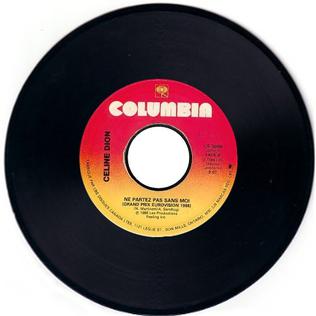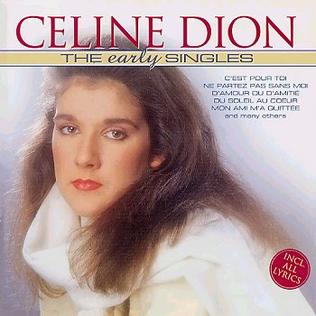
The Eurovision Song Contest 1988 was the 33rd edition of the annual Eurovision Song Contest. It took place in Dublin, Ireland, following Johnny Logan's win at the 1987 contest with the song "Hold Me Now". Organised by the European Broadcasting Union (EBU) and host broadcaster Radio Telefís Éireann (RTÉ), the contest was held at the RDS Simmonscourt on Saturday 30 April 1988 and was hosted by Irish broadcaster Pat Kenny and former model Michelle Rocca, marking the first time since the 1979 contest that two presenters hosted the contest.
Atilla Şereftuğ is a Turkish-Swiss songwriter, born in Istanbul.
Nella Martinetti was a Swiss singer-songwriter, affectionately nicknamed "Bella Nella".

"Ne partez pas sans moi" is a song recorded by Canadian singer Celine Dion. The song was written by Atilla Şereftuğ and Nella Martinetti. It is best known as the Swiss winning entry at the Eurovision Song Contest 1988, held in Dublin. To date, it is the last French language song to win the contest.

The Best of Celine Dion is the third French-language compilation album by Canadian singer Celine Dion, released by Carrere Records in selected European countries on 2 May 1988, preceded by the Eurovision-winning song, "Ne partez pas sans moi". The album was also released in few other European countries. In Germany, it was issued with a different cover and titled Vivre.

"D'abord, c'est quoi l'amour" is the sixth single from Celine Dion's album Incognito, released on 3 October 1988 in Quebec, Canada.

The Early Singles is a French-language compilation album by Canadian singer Celine Dion, released in selected European countries in 2000. It features nineteen rare songs recorded between 1981 and 1988, including tracks from Dion's debut album, "Ce n'était qu'un rêve" and "L'amour viendra". The Early Singles also includes the Eurovision-winning song "Ne partez pas sans moi" and its instrumental version.
Starting on 11 January 1988, Céline Dion's Incognito tournée was a concert tour organized to support the album Incognito. Dion gave 75 shows in Quebec.
Turkey took part in the Eurovision Song Contest 2003 with Sertab Erener. There was no Turkish National Final in 2003. Instead, TRT decided to send well-known singer Sertab Erener to Riga to represent Turkey at the Eurovision Song Contest 2003.
Switzerland competed in the Eurovision Song Contest 2009. The Swiss broadcaster, SRG SSR idée suisse, internally selected Lovebugs to represent the country with the song "The Highest Heights". The song did not progress from the first semi-final of the competition.
Ireland was represented by Johnny Logan with the song "Hold Me Now" in the 1987 Eurovision Song Contest in Brussels.
Switzerland was present at the Eurovision Song Contest 1986, held in Bergen, Norway.
Switzerland was represented by Arlette Zola with the song "Amour on t'aime" at the 1982 Eurovision Song Contest which took place on April 24. Zola was the winner of the Swiss national final for the 1982 Contest, held on January 28.
Turkey was represented in the Eurovision Song Contest 1988 by a music trio named Mazhar Fuat Özkan with the song "Sufi", written and composed by the trio.
Switzerland participated in the Eurovision Song Contest 2017 with the song "Apollo" written by Elias Näslin, Nicolas Günthardt and Alessandra Günthardt. The song was performed by Timebelle. The Swiss entry for the 2017 contest in Kyiv, Ukraine was selected through the national final ESC 2017 – die Entscheidungsshow, organised by the Swiss German speaking broadcaster Schweizer Radio und Fernsehen (SRF) in collaboration with the other broadcasters part of the Swiss Broadcasting Corporation. Artists that were interested in entering the Swiss national final had the opportunity to apply to one of three open selections with defined submission periods: an online platform where entries could be uploaded for public viewing, which was organised by the Swiss-German broadcaster SRF and the Swiss-Romansh broadcaster Radiotelevisiun Svizra Rumantscha (RTR), or by submitting an entry directly to the Swiss-French broadcaster Radio Télévision Suisse (RTS) and/or the Swiss-Italian broadcaster Radiotelevisione svizzera. Up to 20 entries were selected to advance to a "Live Check" round. The "Live Check" was held on 4 December 2016 Zürich and involved an expert panel evaluating the live performances of the entries and selecting six entries to advance to the televised national final. The six finalists performed during the national final on 5 February 2017 at SRF's Studio 1 in Zürich where a public vote ultimately selected "Apollo" performed by Timebelle as the winner.
Switzerland participated in the Eurovision Song Contest 2018. The Swiss German speaking broadcaster Schweizer Radio und Fernsehen (SRF) in collaboration with the other broadcasters part of the Swiss Broadcasting Corporation organised a national final in order to select the Swiss entry for the 2018 contest in Lisbon, Portugal.
Switzerland participated in the Eurovision Song Contest 2019. The Swiss Broadcasting Corporation organised an internal selection in order to select the Swiss entry for the 2019 contest in Tel Aviv, Israel.
Switzerland was scheduled to participate in the Eurovision Song Contest 2020 in Rotterdam, the Netherlands, with the song "Répondez-moi" performed by Gjon's Tears. Its selected entry was internally chosen by Swiss Broadcasting Corporation in March 2020. To this point, the nation had participated in the Eurovision Song Contest sixty times since its first entry in 1956. In March 2020, the European Broadcasting Union (EBU) announced the contest's cancellation due to the pandemic of the coronavirus disease 2019 (COVID-19) and its rapid spread across Europe.
Switzerland participated in the Eurovision Song Contest 2021 in Rotterdam, the Netherlands, having internally selected Gjon's Tears as their representative with the song "Tout l'univers" by the Swiss broadcaster Swiss Broadcasting Corporation. He was due to compete in the 2020 contest with "Répondez-moi" before the event's cancellation.
Switzerland is scheduled to participate in the Eurovision Song Contest 2022 in Turin, Italy, with the Swiss Broadcasting Corporation organizing an internal selection for their representative at the contest.




